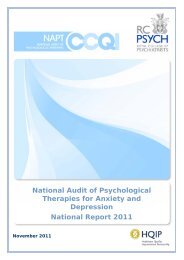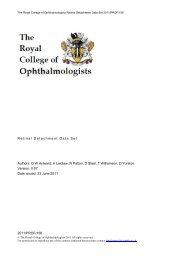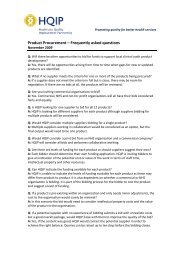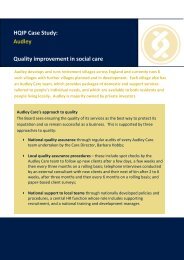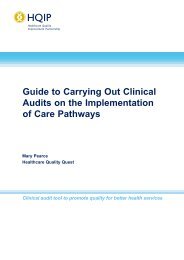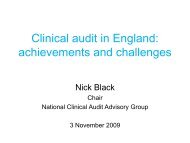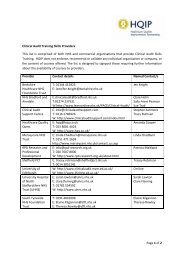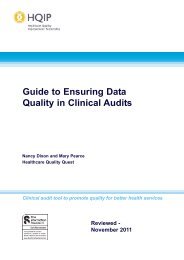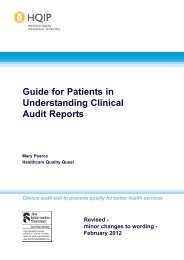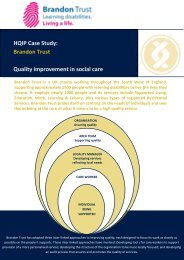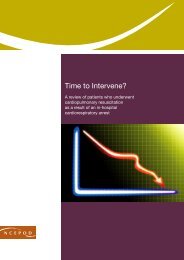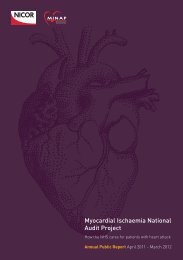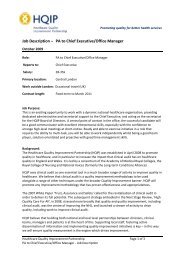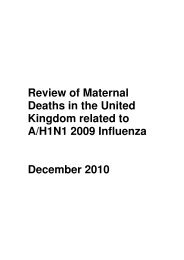NHS Wales National Clinical Audit and Outcome Review ... - HQIP
NHS Wales National Clinical Audit and Outcome Review ... - HQIP
NHS Wales National Clinical Audit and Outcome Review ... - HQIP
Create successful ePaper yourself
Turn your PDF publications into a flip-book with our unique Google optimized e-Paper software.
<strong>NHS</strong> <strong>Wales</strong> <strong>National</strong> <strong>Clinical</strong> <strong>Audit</strong><strong>and</strong> <strong>Outcome</strong> <strong>Review</strong> Plan 2012/13
WG 15261ISBN 978 0 7504 7346 0© Crown copyright 2012
<strong>NHS</strong> <strong>Wales</strong> <strong>National</strong> <strong>Clinical</strong> <strong>Audit</strong> <strong>and</strong> <strong>Outcome</strong> <strong>Review</strong> PlanAnnual Rolling Programme from 2012/13.This Plan sets out how participation <strong>and</strong> the findings from the <strong>National</strong> <strong>Clinical</strong> <strong>Audit</strong><strong>and</strong> <strong>Clinical</strong> <strong>Outcome</strong> <strong>Review</strong> (formerly Confidential Enquiries) Programmes,together with a small number of <strong>Wales</strong> specific audits <strong>and</strong> other reviews will be usedto measure <strong>and</strong> drive improvement in the quality of Welsh healthcare services overthe next 5 years.<strong>National</strong> clinical audits <strong>and</strong> outcome reviews are systematic data collection projectswhich compile <strong>and</strong> measure comparative data on compliance with best practice <strong>and</strong>the achievement of identified clinical outcomes against evidence based st<strong>and</strong>ards.They are cyclical programmes of quality improvement in which measurement is partof a wider cycle of action <strong>and</strong> review to improve the quality of services <strong>and</strong> achievebetter patient outcomes.1. What do we want to achieve?In November 2011, the Minister for Health <strong>and</strong> Social Services launched“Together for Health” her five year vision for the <strong>NHS</strong> in <strong>Wales</strong> which calls forsignificant improvements in health across all areas of <strong>Wales</strong> <strong>and</strong> all groups within<strong>Wales</strong>. This initiative recognises that sharp differences remain between the best <strong>and</strong>worst health in <strong>Wales</strong> <strong>and</strong> that our performance lags behind similar countries insome important aspects. It calls for more use to be made of proven methods forassessing services to improve practice <strong>and</strong> for clinical staff to constantly comparetheir performance with others, both inside <strong>and</strong> outside <strong>Wales</strong>.<strong>NHS</strong> <strong>Wales</strong> needs to become a learning organisation which regularly seeks tomeasure the quality of its services against consistently improving st<strong>and</strong>ards <strong>and</strong> incomparison with other healthcare systems across the UK, Europe <strong>and</strong> the World.This measurement should be used to set improvement priorities <strong>and</strong> to ensure acommitment to carry out recommendations based upon the detailed knowledge ofthe process provided. The st<strong>and</strong>ardised improvement methodology taken forward by1000 Lives Plus is a recognised approach to take this forward within <strong>NHS</strong> <strong>Wales</strong>.The requirement to participate in quality improvement activities is already embeddedwithin the Annual Quality Framework <strong>and</strong> through every Health Board <strong>and</strong> Trustsengagement in 1000 Lives Plus, the national quality improvement programme for<strong>Wales</strong>. The requirement is also included within St<strong>and</strong>ard 6 of the St<strong>and</strong>ards forHealth Services in <strong>Wales</strong>. The results of clinical audit <strong>and</strong> outcome reviews aretherefore one of the core mechanisms for assessing the quality of Welsh healthcareservices <strong>and</strong> confirming how they compare against the best services providedelsewhere.This important activity enables Health Boards <strong>and</strong> Trusts to demonstrate how theyare continuously improving against the overall requirements set out in “Doing well,Doing better - St<strong>and</strong>ards for Health Services in <strong>Wales</strong>. This particularly includesst<strong>and</strong>ard 7 <strong>and</strong> the requirement to provide safe <strong>and</strong> clinically effective care inaccordance with NICE <strong>and</strong> other clinical st<strong>and</strong>ards <strong>and</strong> guidelines. <strong>National</strong> <strong>Clinical</strong><strong>Audit</strong> <strong>and</strong> <strong>Outcome</strong> <strong>Review</strong> are therefore one of the key drivers for change in1
<strong>NHS</strong> <strong>Wales</strong>. This plan will support the objectives of Together for Health <strong>and</strong> theQuality Delivery Plan for <strong>NHS</strong> <strong>Wales</strong> in our drive for improved clinical outcomes.2. What is the role of the <strong>National</strong> <strong>Clinical</strong> <strong>Audit</strong> <strong>and</strong> <strong>Outcome</strong> <strong>Review</strong>Advisory CommitteeTo encourage greater focus on Welsh priorities a <strong>National</strong> <strong>Clinical</strong> <strong>Audit</strong> <strong>and</strong><strong>Outcome</strong> <strong>Review</strong> Advisory Committee (NCAORAC) has been established under theChairmanship of Dr Bruce Ferguson, Medical Director for Abertawe Bro MorgannwgUniversity Health Board. The Committee will:• Provide national leadership <strong>and</strong> professional endorsement for <strong>NHS</strong> <strong>Wales</strong>participation in a rolling annual programme of clinical audit <strong>and</strong> review.• Ensure that audits, reviews <strong>and</strong> national registries are relevant to <strong>Wales</strong><strong>and</strong> provide clearly identifiable Welsh data, where appropriate.• Maximise the benefit by encouraging widespread learning.• Promote action to improve the quality <strong>and</strong> safety of patient care throughapplication of the 1000 Lives Plus st<strong>and</strong>ardised improvement methodologyin areas prioritised by the audit.• Ensure alignment of prioritised areas with 1000 Lives Plus areas of work.• Recommend a programme of national clinical audits <strong>and</strong> clinical outcomereviews which all Health Boards <strong>and</strong> <strong>NHS</strong> Trusts who provide the relevantservices should participate in as a minimum. This programme will bereviewed annually, <strong>and</strong> may be subject to additions during the course ofthe year if the Committee supports Welsh participation in any new<strong>National</strong> <strong>Audit</strong>s being developed.• To liaise with <strong>HQIP</strong> in respect of <strong>NHS</strong> <strong>Wales</strong> requirements.New proposed audits will be assessed by the NCAORAC against the followingcriteria <strong>and</strong> must;• address a clinically important topic;• have clear aims <strong>and</strong> objectives;• be based upon clearly understood st<strong>and</strong>ards;• fit with Welsh priorities <strong>and</strong> requirements;• attempt to embrace the whole pathway of care, including primary care;• have professional endorsement <strong>and</strong> leadership;• be responsive to local requirements.The agreed <strong>NHS</strong> <strong>Wales</strong> programme of audits is likely to include the majority of auditscurrently supported by the <strong>National</strong> <strong>Clinical</strong> <strong>Audit</strong> <strong>and</strong> Patients <strong>Outcome</strong> Programme(NCAPOP) managed by the Healthcare Quality Improvement Partnership (<strong>HQIP</strong>),<strong>and</strong> will also include a number of other <strong>National</strong> or multi-organisational auditsidentified by <strong>NHS</strong> <strong>Wales</strong> <strong>and</strong> the Committee as being essential. We will aim to2
develop the programme to be more inclusive of primary <strong>and</strong> community care. Thefinal agreed list will be published annually in March. The programme for 2012/13 isattached at Annex A.<strong>Audit</strong> programmes evolve over time <strong>and</strong> other sources such as local audits mayhighlight local problems which would benefit from pilot bolt-on data collection in<strong>Wales</strong>. This process needs to be appropriately supported. Proposals for pilot bolt-onnational audits must:• address a clinically important topic;• be based on intelligence that suggests the topic is an issue within <strong>Wales</strong>;• have clear aims <strong>and</strong> objectives;• be based upon clearly understood st<strong>and</strong>ards;• fit with Welsh priorities <strong>and</strong> requirements;• be part of the pathway of care;• have professional endorsement <strong>and</strong> leadership;• be responsive to local requirements;• include plans on how the additional data will be collected, analysed <strong>and</strong>reported;• not impose undue additional burden on those providing the data;• highlight how existing resources alone can be deployed to deliver theaudit.In the interests of maintaining quality while enabling evolution of audits intopotentially important new areas, NCAORAC will be able to indicate where they donot approve of a pilot bolt-on audit.Full list of Committee Membership:Bruce Ferguson (Chair), Medical Director, Abertawe Bro Morgannwg UHB.Robin Burgess, CEO, Healthcare Quality Improvement Partnership.Peter Barrett-Lee, Medical Director, Velindre <strong>NHS</strong> Trust.Martin Murphy, <strong>Clinical</strong> Director at <strong>NHS</strong> <strong>Wales</strong> Informatics service.Janet Davies, Patient Safety Advisor, Welsh Government.Caroline Oakley, Director of Nursing, Hywel Dda HB.Arlene Shenkorov, Chair, Welsh <strong>Clinical</strong> <strong>Audit</strong> & effectiveness Association.Frank Mansell, <strong>Clinical</strong> Governance Support & dev. Unit, NLIAH.Alison Strode, Therapy Adviser for <strong>Wales</strong>, Welsh Government.Denise Richards, Nursing Officer Acute Services, Welsh Government.Karen Gully, Senior Medical Officer (Gen Pract <strong>and</strong> Prim Care), Welsh Gov.Carl Eley, Head of Achieving Healthcare Excellence, Welsh Government.Am<strong>and</strong>a Smith, Director of Therapies <strong>and</strong> Health Science, Powys tHB.Nigel Monaghan, Public Health Consultant, Public Health <strong>Wales</strong>.3
3. How will participation, learning <strong>and</strong> action on the findings beencouraged throughout <strong>Wales</strong>?This will be achieved by:Improved communication <strong>and</strong> encouragement of audit:• With the publication of a twice a year All-<strong>Wales</strong> <strong>National</strong> <strong>Clinical</strong> <strong>Audit</strong> <strong>and</strong><strong>Outcome</strong> <strong>Review</strong> e-bulletin highlighting recent developments <strong>and</strong>publications including the reports <strong>and</strong> findings of national audits.• Feeding back on the benchmarked performance of individual providerswithin clinical audits <strong>and</strong> reviews to these organisations as appropriate forreflection <strong>and</strong> action.• By raising the profile of clinical audit with boards, patient groups, clinicians<strong>and</strong> all staff working within the <strong>NHS</strong>, including by national events <strong>and</strong>liaison with professional bodies in <strong>Wales</strong> to encourage audit amongst theirdisciplines <strong>and</strong> specialisms.• Developing closer partnerships working with LHB/Trust clinical audit teamsto improve knowledge <strong>and</strong> underst<strong>and</strong>ing of national <strong>and</strong> local audit <strong>and</strong>review activities.• Working in partnership with other healthcare organisations eg. PublicHealth <strong>Wales</strong>, <strong>National</strong> Welsh Information Service, <strong>National</strong> Leadership &Innovation Agency for Healthcare to promote <strong>and</strong> encourage a culture ofparticipation in audit <strong>and</strong> action on findings.Identifying areas needing a national approach to improvement:• <strong>Review</strong>ing common issues for all Welsh healthcare providers arising fromaudit <strong>and</strong> reviews <strong>and</strong> sharing solutions.• Through the development of closer links to 1000 Lives plus improvementprogramme.• Working in partnership, via <strong>HQIP</strong> <strong>and</strong> with audit project teams to ensurethe provision of Welsh-specific findings <strong>and</strong> potential solutions, <strong>and</strong>develop <strong>and</strong> organise workshops <strong>and</strong> events to disseminate them.Addressing clinical services where performance may give cause for concern:• Clearly identifying the comparative performance of individual providerorganisations <strong>and</strong> underst<strong>and</strong>ing the reasons for any disparity.• Developing <strong>and</strong> publishing a protocol confirming the arrangements for theidentification <strong>and</strong> h<strong>and</strong>ling of organisations identified in audits <strong>and</strong> reviewsas being “Outliers” including such activity designed to improve <strong>and</strong>encourage quality improvement.4
Greater transparency:• By seeking to improve the way in which the findings, recommendations<strong>and</strong> improvement actions from audit <strong>and</strong> reviews are made available topatients, public <strong>and</strong> all staff working in the <strong>NHS</strong>.4. What is the Role of Welsh Government?In partnership with the Department of Health in Engl<strong>and</strong>, other UK GovernmentHealth Departments <strong>and</strong> the Healthcare Quality Improvement Partnership (<strong>HQIP</strong>),the Welsh Government supports <strong>and</strong> funds the cost of <strong>NHS</strong> <strong>Wales</strong> participation inthe <strong>National</strong> <strong>Clinical</strong> <strong>Audit</strong> <strong>and</strong> <strong>Clinical</strong> <strong>Outcome</strong> <strong>Review</strong> Programme. TheWelsh Government also seeks to encourage greater participation in <strong>and</strong> acting onthe findings from clinical audit leading to improved services, better patient outcomes<strong>and</strong> safer patient care through improved communication, leadership, feedback <strong>and</strong>by building on the advice that it receives from the NCAORAC.5. What are the responsibilities of Welsh Health Boards <strong>and</strong> Trusts?Welsh Health Boards <strong>and</strong> Trusts should provide the resources to enable their staff toparticipate in all audits, reviews <strong>and</strong> national registers included within the programmethat fall within the services they provide. They should complete the full audit cycleimplementing an action plan to drive changes or improvements in healthcareservices to meet recommendations.To ensure the maximum benefit is derived from participation, LHBs <strong>and</strong> Trustsshould:• Ensure the necessary resources, governance <strong>and</strong> organisationalstructures are place to support participation in audits, reviews <strong>and</strong> nationalregisters <strong>and</strong> to ensure implementation of findings using the st<strong>and</strong>ardisedimprovement methodology.• Appoint a clinical lead to act as a champion <strong>and</strong> point of contact for every<strong>National</strong> <strong>Clinical</strong> <strong>Audit</strong> <strong>and</strong> <strong>Outcome</strong> <strong>Review</strong> which the Health Board isparticipating in.• Have clearly identifiable procedures in place to formally report throughtheir assurance processes to the Board their participation in the<strong>National</strong> <strong>Clinical</strong> <strong>Audit</strong> <strong>and</strong> <strong>Outcome</strong> <strong>Review</strong> Programme <strong>and</strong> subsequentquality improvement <strong>and</strong> risk identification against recommendations.• Have clear lines of communication which ensures full board engagementin the consideration of audit <strong>and</strong> review of findings <strong>and</strong>, where required,the change process to ensure improvements in the quality <strong>and</strong> safety ofservices take place.• Facilitate the wider use of data from audit <strong>and</strong> national registries to beused as supporting information for medical revalidation.• Seek to ensure learning from audit <strong>and</strong> review is shared across theorganisation <strong>and</strong> communicated to staff <strong>and</strong> patients.5
6. How Will We Measure Success?By year on year consideration of audit reports <strong>and</strong> in comparison with otherUK, European <strong>and</strong> International healthcare systems to determine how compliancewith best practice <strong>and</strong> achievement of healthcare outcomes compares to national<strong>and</strong> international benchmarks.The following key criteria will also be used for judging success:• 100% participation by all LHBs <strong>and</strong> Trusts where applicable in the fullprogramme of <strong>National</strong> <strong>Clinical</strong> <strong>Audit</strong>s <strong>and</strong> <strong>Clinical</strong> <strong>Outcome</strong> <strong>Review</strong> bythe end of 2012-13.• Measurable year on year improvements in performance to achieve thehighest st<strong>and</strong>ards. Organisations recognised as being within the topquartile for each audit <strong>and</strong> maintaining that level.• Improvements in the quality <strong>and</strong> safety of patient outcomes <strong>and</strong>experience brought about by learning <strong>and</strong> action arising from the findingsof <strong>National</strong> <strong>Clinical</strong> <strong>Audit</strong> <strong>and</strong> <strong>Clinical</strong> <strong>Outcome</strong> <strong>Review</strong> reports.• Less variation between local services.By 2016 the aim must be to see Welsh services being identified as amongst the bestin the UK, Europe <strong>and</strong> the rest of the World.7. How Will We Maintain SuccessIt is one thing to attain success <strong>and</strong> another to maintain it sustainably. The audit <strong>and</strong>quality improvement approach has the advantage of engaging those placed to makechange <strong>and</strong> those expected to deliver <strong>and</strong> maintain change on a daily basis. Thisapproach has a demonstrated track record of delivering <strong>and</strong> maintaining serviceimprovement for a range of issues in a range of settings. Thus, where there areexpectations of delivering <strong>and</strong> maintaining better quality care <strong>and</strong> outcomes, theaudit <strong>and</strong> quality improvement should be the normally used first-line approach.8. ConclusionThe findings <strong>and</strong> recommendations from <strong>National</strong> clinical audit, outcome reviews <strong>and</strong>all other forms of reviews <strong>and</strong> assessments will be one of the principal mechanismsfor assessing the quality <strong>and</strong> effectiveness of healthcare services provided by LHBs<strong>and</strong> Trusts in <strong>Wales</strong>. In line with our stated ambition to develop a healthcare servicethat is recognised as being one of the best in the world, <strong>and</strong> to drive forwardimprovement, the clinical audit process will also be used to assess Welsh healthcareservices against similar services being provided in other countries in the UK, Europe<strong>and</strong> Internationally.6
Annex AAnnual Programme for 2012 - 13 of <strong>National</strong> <strong>Clinical</strong> <strong>Audit</strong> <strong>and</strong><strong>Outcome</strong> <strong>Review</strong>s in which all Welsh LHBs/Trusts must participate(where services are provided)Cancer:• <strong>National</strong> Bowel Cancer <strong>Audit</strong> *• <strong>National</strong> Lung Cancer <strong>Audit</strong> *• <strong>National</strong> Head <strong>and</strong> Neck Cancer <strong>Audit</strong> *• <strong>National</strong> Oesophago-gastric Cancer <strong>Audit</strong> *• <strong>National</strong> Prostate Cancer <strong>Audit</strong> (new audit being developed) *• The All <strong>Wales</strong> Breast Cancer <strong>Audit</strong>Heart:• <strong>National</strong> Heart Failure <strong>Audit</strong> *+• <strong>National</strong> Heart Rhythm Management <strong>Audit</strong> *• <strong>National</strong> Adult Cardiac Surgery <strong>Audit</strong> *• <strong>National</strong> Angioplasty <strong>Audit</strong> *• <strong>National</strong> Congenital Heart Disease <strong>Audit</strong> *• Myocardial Ischaemia <strong>National</strong> <strong>Audit</strong> Project (MINAP) *+• The All <strong>Wales</strong> Coronary <strong>Audit</strong>+• Central Cardiac <strong>Audit</strong> Database (CCAD) Percutaneous Coronary Intervention <strong>Audit</strong>• CCAD <strong>National</strong> Congenital <strong>Audit</strong>• Familial Hypercholesterolaemia <strong>Audit</strong>• The Cardiac Rehabilitation <strong>Audit</strong>Mental Health:• <strong>National</strong> <strong>Audit</strong> of Psychological Therapies * (<strong>and</strong> Welsh Government <strong>Review</strong> of Access to <strong>and</strong>Implementation of Psychological Therapy Treatment in <strong>Wales</strong>)• <strong>National</strong> Dementia <strong>Audit</strong> *+• <strong>National</strong> <strong>Audit</strong> of Schizophrenia *Older People:• <strong>National</strong> Carotid Interventions <strong>Audit</strong> *• <strong>National</strong> Sentinel Stroke <strong>Audit</strong> * (being developed as a new audit with SINAP in 2012-13)• <strong>National</strong> Hip Fracture Database <strong>Audit</strong> *• <strong>National</strong> Falls <strong>Audit</strong> *+• Continence Care <strong>Audit</strong> *7
Women’s <strong>and</strong> Children’s Health:• Paediatric Intensive Care (PICaNet) *• <strong>National</strong> Heavy Menstrual Bleeding <strong>Audit</strong> *• <strong>National</strong> Neonatal <strong>Audit</strong> Programme <strong>Audit</strong> *• <strong>National</strong> Childhood Epilepsy <strong>Audit</strong> *• UK Obstetric SurveillancePathology:• SHOT - Serious Hazards of Blood Transfusion• Use of Platelets• Use of ORh Negative• Use of Group O RhD Negative Blood• Use of Red Blood Cells in Neonates & Children• Blood Transfusion - Bedside <strong>Audit</strong>• Fresh Frozen PlasmaNursing:• Fundamentals of Care <strong>Audit</strong>Long-Term Conditions:• Inflammatory Bowel Disease *• <strong>National</strong> Joint Registry *• <strong>National</strong> Diabetes <strong>Audit</strong> *• Pain Database *Other:• Trauma <strong>Audit</strong> & Research Network• <strong>National</strong> Asthma Deaths <strong>Audit</strong> (new audit being developed) *• <strong>National</strong> Emergency Laparotomy <strong>Audit</strong> (new audit being developed) *• <strong>National</strong> Chronic Obstructive Pulmonary Disease <strong>Audit</strong> (new audit being developed) *• <strong>National</strong> Vascular Registry <strong>Audit</strong> (new audit being developed) *• Comparative <strong>Audit</strong> of Critical Care Unit Adult Patient <strong>Outcome</strong>s ( ICNARC )• Welsh Intensive Care Unit <strong>Audit</strong> ( Welsh Intensive Care Society )+(* denotes NCAPOP <strong>Audit</strong>s)(+denotes outcome measure linked to 1000 Lives Plus area of work)8
<strong>Clinical</strong> <strong>Outcome</strong>s <strong>Review</strong> Programme (formerly ConfidentialEnquiries)Medical <strong>and</strong> Surgical Programme:• Cardiac Arrest Procedures Study• Bariatric Surgery Study• Alcohol Related Liver Disease Study• Subarachnoid Haemorrhage StudyMental Health Programme+:• Annual Report of Suicide, Homicide, <strong>and</strong> Sudden Unexpected Death by People with a MentalIllness• General Population suicide in primary care• Models of Service Delivery• Quality of Risk AssessmentChild Health Programme:• Chid Death <strong>Review</strong>• Child Health Thematic <strong>Review</strong>Maternal, Infant <strong>and</strong> Perinatal Programme+:Programme currently under review - OJEU Procedure announced on 19 December 201.Data continues to be collected by the Maternal <strong>and</strong> Perinatal Mortality Notification (MPMN)secure web portal9



